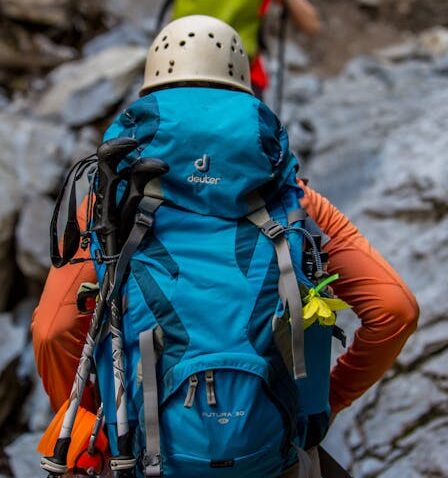
So, here’s a bit about my experience with hiking poles. I used to be all about them. They were my trusty sidekick on countless trails. These days, though? Not so much. I’ve pared down my usage, only bringing them for specific hikes and I often find I don’t use them. This shift in my approach is super personal, and it’s all about finding what works best for me on the trail. You can read about my hiking experience here.
Choosing to use hiking poles or not is a very personal decision. Like choosing your favorite pair of hiking boots or your go-to trail snacks, it boils down to what makes your adventures enjoyable and comfortable. Some folks swear by their poles and wouldn’t hit the trail without them. Others, like me, find themselves reaching for them less often, preferring the freedom of trekking without. And that’s perfectly okay.
Should I use hiking poles, is a question that all hikers have asked themselves at some point in their hiking experience.
In this piece, I’m going to lay out both sides of the story – the upsides and the potential downsides of using hiking poles. Whether you’re a seasoned hiker or just dipping your toes into the wilderness, my goal is to give you all the info you need to make the decision that’s right for you. Get ready to weigh the pros and cons for yourself.
Pros of Using Hiking Poles
Turning to the pros, hiking poles can be real game-changers. They’ve got some solid benefits that might make you wonder why you haven’t tried them sooner.
- Boosting Calorie Burn: To start with, hiking poles can help boost your calorie burn by around 20%. If you’re looking for a bit more of a workout, these could be a fantastic addition to your gear.
- Walking Speed: Then there’s the walking speed and gait improvement. With poles, you might find you’re walking with a more natural and quicker stride. They can also make those steep inclines feel a bit more manageable, reducing how much effort it all seems to take.
- Joint Support: When it comes to joint and muscle strain, hiking poles shine. They can take a load off your knees and ankles, especially on those brutal downhill treks. This translates to less muscle damage and overall fatigue, making your hike more enjoyable and less painful.
- Balance: Balance and stability are other big wins. Poles can offer that extra bit of support when you’re hauling a heavy backpack or if the trail gets tricky. They are also useful for testing out ground stability or when crossing a river. You wouldn’t believe how handy an extra point of contact can be!
- Full-body workout: Hiking poles also offer a full-body workout. Engaging your upper body might improve your circulation and posture, turning a leg workout session into a whole-body affair. It’s like turning your hike into a total-body exercise.
- Versatile: Lastly, let’s talk versatility. Hiking poles can double as tent poles if you’re setting up an ultralight shelter. They can also be used as a selfie stick for those epic mountain-top shots, a defense tool if you run into some unfriendly critters, and even for first aid situations. Seriously, they’re like the Swiss Army knife of hiking gear.
Studies have been done on the benefits of using hiking poles, perticularly with a pack and going down hill. Here are the results of a study by Michael Bohne and Julianne Abendroth-Smith titled Effects of Hiking Downhill Using Trekking Poles While Carrying External Loads. In my mind the benefits are conclusive.
Cons and Considerations of Hiking Poles
Now, it’s time to talk cons and considerations. While hiking poles come with a bunch of benefits, they’re not without their drawbacks.
- More Effort: The increased calorie burn means more effort. Sure, it’s great for fitness, but on a long trek, it might leave you more exhausted than you’d like.
- Over Reliance: There’s also the potential for over-reliance. If you use poles all the time, you might find your balance and coordination suffering when you go without them. Your body gets used to that extra support, and you could end up feeling a bit wobbly without it.
- Complacency: Using poles can give a false sence of security. I find without them, I am more careful with my feet placement and balance, which is one of the benefits of hiking.
- Limitations: Practical limitations can also be a big deal. Think about the added weight and bulk. When you’re not using them, they just hang around, adding extra weight to your pack. On narrow or scrambling trails, they can be more of a hassle than a help, getting in the way and making maneuvering tricky. The number of times I seen a hiker with their poles strapped to their backpack suddenly get their pole caught in a branch of a tree and be jolted to a stop, to then have to dis-entangle their pole.
- Costly: Cost is another consideration. Good quality poles aren’t cheap. If you don’t use them correctly, you won’t get the full benefit, making the investment feel like a waste.
- Correct Use: Speaking of using them correctly, proper technique is crucial. Without it, you might not see all those benefits everyone raves about or could even injure yourself. I see many hikers not adjust their poles’ height when using them in a decline and then go tumbling over as their poles are too short causing them to lean forward and over-balance.

So, while hiking poles can do wonders for your adventure, they’re not a one-size-fits-all solution. You’ve got to weigh these cons against the pros to see if they fit into your hiking style and needs.
Conclusion: Evaluating the Necessity of Hiking Poles
Alright, so where does that leave us with hiking poles? They’ve got some standout benefits like boosting your hiking efficiency, reducing joint strain, and giving you extra balance. For some, especially on challenging terrains or longer hikes, they’re indispensable.
But their necessity really boils down to your personal preference and the conditions of your hikes. If you’re facing steep inclines, rough terrain, or carrying a heavy backpack, hiking poles can be a lifesaver. However, for shorter, flatter trails or if you prefer a more minimalist approach, you might find them more of a hindrance.
If I’m doing a hike with many creek crossings, I will bring one to assist me. If I had knee issues which resulted in me experiencing pain after a hike, then I would also consider using poles. If I was in my eighties and still hiking, I would also consider using them.
It’s all about weighing the added weight and complexity against the benefits they bring. Every hiker’s needs are different, and what fits one person’s hiking style might not suit another’s. Keeping that in mind, don’t be afraid to experiment and see what works best for you.
Remember, the goal is to make your hikes safer and more enjoyable. Poles are just one tool in the toolbox. Whether you decide to stick with them or not, the key is finding gear that enhances your hiking experience. Happy Hiking!
What’s your opinion and experience with hiking poles? I’d love to hear your opinion.

It sounds like you’ve put a lot of thought and personal experience into this post about hiking poles, and it really shows. Your balanced perspective on the pros and cons is refreshing, especially since many people either swear by poles or completely dismiss them. I appreciate how you’ve highlighted that it’s not a one-size-fits-all situation and that the decision should be based on individual needs and trail conditions.
Overall, your guide does a great job of encouraging hikers to weigh their options and find what works best for them, which is really what hiking is all about personal enjoyment and comfort on the trail. Thanks for sharing your insights!
Using hiking poles can be highly beneficial, especially on challenging terrains or long hikes. They provide extra stability, reduce strain on your joints, and can improve balance, making them essential for some hikers. However, if you’re on flat or easy trails and prefer a lighter load, they might feel more like an extra than a necessity. Ultimately, whether they are essential or extra depends on your personal preference, the terrain, and the length of your hike. Thanks.